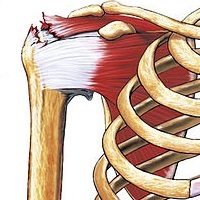
Photo from wikipedia
BACKGROUND Both anatomic and reverse total shoulder arthroplasty are considered successful surgeries to treat a variety of painful shoulder conditions. Although implant survivorship for both is good to excellent in… Click to show full abstract
BACKGROUND Both anatomic and reverse total shoulder arthroplasty are considered successful surgeries to treat a variety of painful shoulder conditions. Although implant survivorship for both is good to excellent in the long term, a variety of factors-clinical, technical, and psychosocial-may affect patient-reported outcomes after shoulder arthroplasty. METHODS A comprehensive review of the literature was performed systematically using keywords "shoulder arthroplasty outcomes," "psychosocial factors shoulder," "shoulder replacement outcomes," "depression shoulder arthroplasty," "satisfaction shoulder arthroplasty," "factors shoulder replacement," "expectations shoulder arthroplasty," and "predictors shoulder arthroplasty." Studies meeting the inclusion criteria were screened and analyzed. Type of surgery performed, sample size, outcome measures, and other factors influencing patient outcomes were recorded and analyzed. RESULTS Sixteen studies met the inclusion criteria. Six reviewed mental health disorders as predictors of postoperative outcome after shoulder arthroplasty. Of these, 4 found that disorders such a depression and anxiety were associated with increased risk of perioperative complications and lower final functional outcome scores. Two studies evaluated workers' compensation status as a possible predictor of outcomes and found that patients with claims had lower satisfaction and outcome scores at final follow-up compared with those without claims. Two studies showed that preoperative opioid use was associated with lower outcome scores and overall satisfaction rate after shoulder arthroplasty. Three studies showed that higher patient confidence and preoperative expectations were correlated with better outcomes. CONCLUSION Our review shows that psychosocial factors may play just as important role in affecting patient outcomes after total shoulder arthroplasty as technical factors.
Journal Title: Journal of shoulder and elbow surgery
Year Published: 2019
Link to full text (if available)
Share on Social Media: Sign Up to like & get
recommendations!